
Styphelia sieberi, commonly known as prickly beard-heath, is a species of flowering plant in the heath family Ericaceae and is endemic to south-eastern continental Australia. It is an erect, densely-branched shrub with oblong to more or less egg-shaped leaves with the narrower end towards the base, and white, tube-shaped flowers arranged singly in upper leaf axils.

Styphelia fletcheri is a species of flowering plant in the heath family Ericaceae and is endemic to south-eastern continental Australia. It is a densely-branched shrub with sharply-pointed oblong leaves, and pendent, tube-shaped white flowers in pairs in upper leaf axils.
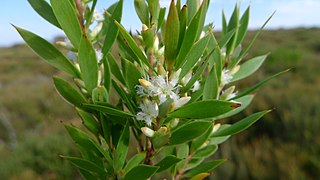
Styphelia esquamata, commonly known as the swamp beard-heath, is a species of flowering plant in the heath family Ericaceae and is endemic to south-eastern Australia. It is a slender shrub with mainly elliptic leaves, and short-lived white, tube-shaped flowers arranged singly or in pairs in upper leaf axils.

Styphelia pendula is a species of flowering plant in the heath family Ericaceae and is endemic to the south-west of Western Australia. It is an erect, straggling shrub with oblong leaves and white, tube-shaped flowers that are bearded inside.
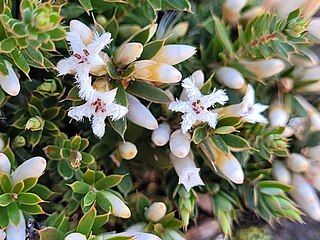
Styphelia nesophila, commonly known as sharp beard-heath, is a species of flowering plant in the heath family Ericaceae and is native to south-eastern Australia and New Zealand, where it is known as pātōtara, or dwarf mingimingi. It is a prickly, prostrate to trailing or low-growing shrub with egg-shaped leaves, and erect, tube-shaped white flowers usually arranged singly in leaf axils.

Styphelia biflora is a species of flowering plant in the heath family Ericaceae and is endemic to eastern Australia. It is an erect to spreading shrub with hairy branchlets, oblong leaves and small white flowers.

Styphelia clelandii, commonly known as Cleland's bearded-heath, is a species of flowering plant in the heath family Ericaceae and is endemic to the south-east of continental Australia. It is weak, open shrub with broadly egg-shaped leaves and white flowers arranged singly or in pairs in leaf axils near the ends of the branches.
Styphelia confertus, commonly known as Torrington beard-heath, is a species of flowering plant in the heath family Ericaceae and is endemic to a restricted part of New South Wales. It is a small shrub with erect, oblong or lance-shaped leaves, and white, tube-shaped flowers, the petals with shaggy hairs.

Styphelia cordifolia, commonly known as heart-leaved beard-heath, is a species of flowering plant in the heath family Ericaceae and is endemic to Australia. It is an erect shrub with broadly egg-shaped to round leaves, and white, tube-shaped flowers, the petals bearded on the inside.

Leucopogon costatus, commonly known as twiggy beard-heath, is a species of flowering plant in the heath family Ericaceae and is endemic to southern continental Australia. It is an erect or straggling shrub with broadly egg-shaped, stem-clasping leaves, and white, tube-shaped flowers, the petals densely bearded on the inside.
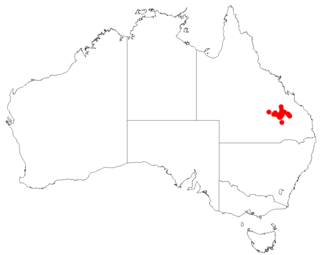
Styphelia grandiflora is a species of flowering plant in the heath family Ericaceae and is endemic to Carnarvon National Park in south-eastern Queensland. It is a shrub with softly-hairy branchlets, oblong leaves and white flowers.
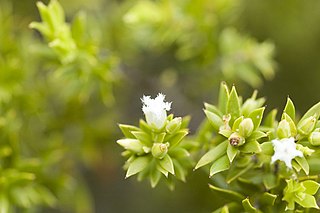
Styphelia leptospermoides is a species of flowering plant in the heath family Ericaceae and is endemic to eastern Australia. It is an erect, bushy shrub with elliptic to lance-shaped or oblong leaves, and white, tube-shaped flowers usually arranged singly in upper leaf axils.

Styphelia margarodes is a species of flowering plant in the heath family Ericaceae and is endemic to near-coastal areas of eastern Australia. It is an erect, spreading shrub with egg-shaped leaves with the narrower end towards the base, and small numbers of white, tube-shaped flowers usually arranged singly or in pairs in upper leaf axils.

Styphelia neoanglica, commonly known as New England beard heath, is a species of flowering plant in the heath family Ericaceae and is endemic to eastern Australia. It is an erect shrub with egg-shaped leaves, sometimes with the narrower end towards the base, and white, tube-shaped flowers arranged singly in leaf axils and bearded inside.

Leucopogon rupicola is a species of flowering plant in the heath family Ericaceae and is endemic to Queensland. It is a shrub with linear leaves and white, tube-shaped flowers usually arranged singly in leaf axils.

Styphelia sonderensis, commonly known as Mount Sonder beard-heath, is a species of flowering plant in the heath family Ericaceae and is endemic to the south of the Northern Territory. It is a slender, erect or spreading shrub with elliptic leaves and white flowers arranged singly in leaf axils near the ends of branches.
Leucopogon trichostylus, commonly known as daphne heath, is a species of flowering plant in the heath family Ericaceae, and is endemic to eastern Australia. It is an erect to spreading shrub with elliptic to egg-shaped leaves, and white, tube-shaped flowers arranged singly or in groups of up to three in leaf axils.
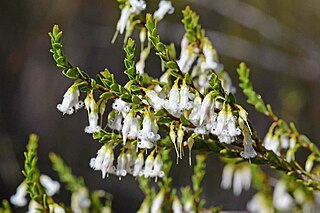
Leucopogon woodsii, commonly known as nodding beard-heath, is a species of flowering plant in the heath family Ericaceae and is endemic to southern continental Australia. It is a slender shrub with more or less erect, egg-shaped leaves, and pendent white, tube-shaped flowers with densely bearded lobes.

Styphelia capillaris, commonly known as Horts' styphelia, is a species of flowering plant in the heath family Ericaceae and is endemic to a small area of south-western Western Australia. It is a dense, spreading shrub with narrowly egg-shaped to narrowly elliptic leaves and white flowers arranged singly or in pairs in leaf axils.

Styphelia exarrhena, commonly known as desert styphelia, is a species of flowering plant in the heath family Ericaceae and is endemic to southern continental Australia. It is an erect shrub with erect or spreading egg-shaped leaves, and cream-coloured, tube-shaped flowers arranged singly or in pairs in upper leaf axils.


















